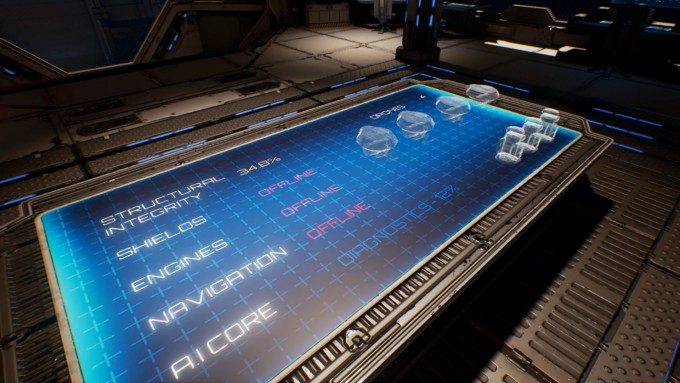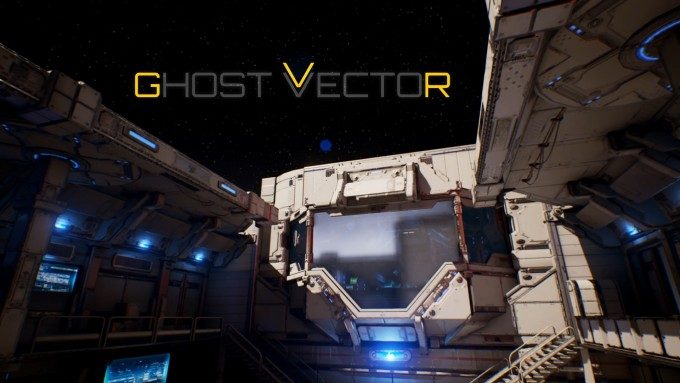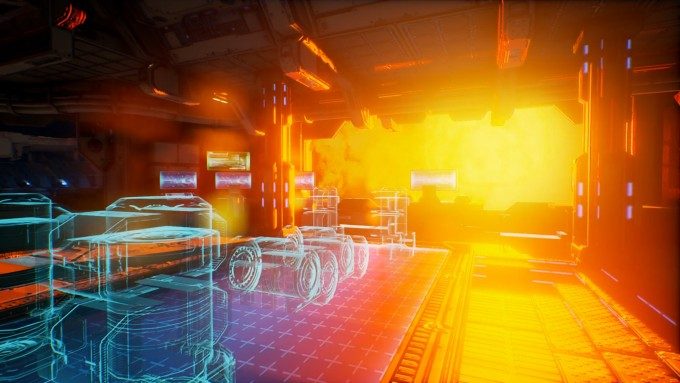Thomas Kadlec, the talented developer behind the impressive Star Trek Voyager Bridge VR experience, has turned his attention to his own sci-fi creation in the form of a new project which aims to fuse the mechanics of FTL with eye-catching production design – Ghost Vector.
We first came across Thomas Kadlec when we stumbled over his incredible work bringing Star Trek’s Voyager starship to life in vivid Unreal Engine powered detail.
The developer then turned his attention to virtual reality pinball, with the neat looking project Pinball Labs, the Kickstarter for which Kadlec had to abandon (despite coming close to his goal) – mainly due to feedback from the community.
He’s now turning his attention to a creation all his own, one that he took to reddit specifically to gauge interest about. An original sci-fi creation called Ghost Vector that lets him stretch his 3D modelling and animation talents whilst allowing him to explore some of his favourite game genres, all made from the ground up for virtual reality.
To gauge interest for various projects Kadlec had in mind, he took to social media to test the water. “After polling the reddit VR community “Ghost Vector” was the project that had the right combination of interest and feasibility,” Kadlec says. The developer, currently working solo, says his inspirations for the new game are starship command titles like FTL.
“In Ghost Vector you are the sole survivor of a large starship, disabled and heavily damaged. You must find ways to repair, upgrade, and defend your ship from increasing enemy attacks as you traverse hostile sectors of the galaxy in an attempt to regroup with the fleet,” Kadlec tells me. “The ship is equipped with autonomous maintenance drones and you’ll find much needed resources through mining and salvage operations. You direct the ship’s systems and drones through the “Holographic Command Console” or HCC. The HCC is located on the bridge and provides Navigation, Engineering, and Tactical interfaces. The ship’s damaged but sporadically functioning A.I. will respond to available voice commands and provide verbal updates on the ship’s status.” Recent super hero movies and their special effects also feature among Kadlec’s muses. “One source of inspiration for the H.C.C. has been the highly detailed user interfaces portrayed in recent Marvel movies. For example, the consoles on the Helicarrier bridge, the J.A.R.V.I.S. holographic UIs and the ship consoles in Guardians of the Galaxy. I have collected a lot of reference material from those and many other sci-fi user interfaces. I’ve also sought out consultation from freelance concept artists who have worked on some pretty amazing sci-fi projects.”
Recent super hero movies and their special effects also feature among Kadlec’s muses. “One source of inspiration for the H.C.C. has been the highly detailed user interfaces portrayed in recent Marvel movies. For example, the consoles on the Helicarrier bridge, the J.A.R.V.I.S. holographic UIs and the ship consoles in Guardians of the Galaxy. I have collected a lot of reference material from those and many other sci-fi user interfaces. I’ve also sought out consultation from freelance concept artists who have worked on some pretty amazing sci-fi projects.”
If this sounds mighty ambitious for a lone developer, it is. Kadlec is therefore mining high quality assets from the rich source of community developer creations out there. “While I strive for a “high production value” sci-fi aesthetic, I’m definitely an “indie dev”. I’m literally a team of one, at least for now. To achieve the look I’m after, I leverage high quality items from the Asset Store and Epic’s Content Samples whenever possible. When I need an asset I can’t find for purchase, I either make it myself or hire a freelance artist to create the item for me. Also, having access to Unreal Engine 4’s open source code is like having a stable of talented software engineers.”
The project is really just starting out, but Kadlec plans to raise awareness with his teaser trailer (which you can see at the top of the page) and leverage Steam’s Greenlight platform for building momentum and, eventually giving people access to the game. “The near term goal is to have a limited playable demo available within the next two to three months, just as early adopters start receiving the first batch of consumer VR headsets.”
He must be doing something right, as the title is, at the time of writing, top of Steam’s Greenlight Concepts chart. We’ll keep in touch with Thomas and Ghost Vector and keep you up to date. You can keep tabs on the project by following the twitter feed here.








